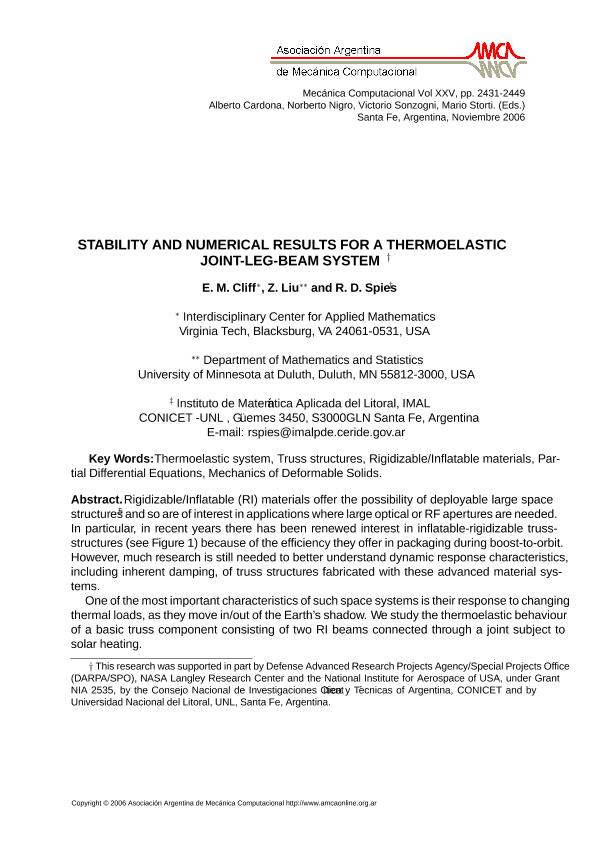Mostrar el registro sencillo del ítem
dc.contributor.author
Cliff, E.M.
dc.contributor.author
Liu, Z.
dc.contributor.author
Spies, Ruben Daniel

dc.date.available
2019-09-24T17:00:18Z
dc.date.issued
2006-12
dc.identifier.citation
Cliff, E.M.; Liu, Z.; Spies, Ruben Daniel; Stability And Numerical Results For A Thermoelastic Joint-Leg-Beam System; Asociación Argentina de Mecánica Computacional; Mecánica Computacional; 25; 12-2006; 2431-2449
dc.identifier.issn
2591-3522
dc.identifier.uri
http://hdl.handle.net/11336/84280
dc.description.abstract
Rigidizable/Inflatable (RI) materials offer the possibility of deployable large space structures5 and so are of interest in applications where large optical or RF apertures are needed. In particular, in recent years there has been renewed interest in inflatable-rigidizable truss structures because of the efficiency they offer in packaging during boost-to-orbit. However, much research is still needed to better understand dynamic response characteristics, including inherent damping, of truss structures fabricated with these advanced material systems. One of the most important characteristics of such space systems is their response to changing thermal loads, as they move in/out of the Earth’s shadow. We study the thermoelastic behaviour of a basic truss component consisting of two RI beams connected through a joint subject to solar heating.5 and so are of interest in applications where large optical or RF apertures are needed. In particular, in recent years there has been renewed interest in inflatable-rigidizable truss structures because of the efficiency they offer in packaging during boost-to-orbit. However, much research is still needed to better understand dynamic response characteristics, including inherent damping, of truss structures fabricated with these advanced material systems. One of the most important characteristics of such space systems is their response to changing thermal loads, as they move in/out of the Earth’s shadow. We study the thermoelastic behaviour of a basic truss component consisting of two RI beams connected through a joint subject to solar heating.
dc.format
application/pdf
dc.language.iso
eng
dc.publisher
Asociación Argentina de Mecánica Computacional
dc.rights
info:eu-repo/semantics/openAccess
dc.rights.uri
https://creativecommons.org/licenses/by-nc-sa/2.5/ar/
dc.subject.classification
Matemática Aplicada

dc.subject.classification
Matemáticas

dc.subject.classification
CIENCIAS NATURALES Y EXACTAS

dc.title
Stability And Numerical Results For A Thermoelastic Joint-Leg-Beam System
dc.type
info:eu-repo/semantics/article
dc.type
info:ar-repo/semantics/artículo
dc.type
info:eu-repo/semantics/publishedVersion
dc.date.updated
2019-09-20T14:18:24Z
dc.journal.volume
25
dc.journal.pagination
2431-2449
dc.journal.pais
Argentina

dc.journal.ciudad
Santa Fe
dc.description.fil
Fil: Cliff, E.M.. Interdisciplinary Center for Applied Mathematics Virginia Tech; Estados Unidos
dc.description.fil
Fil: Liu, Z.. University of Minnesota at Duluth; Estados Unidos
dc.description.fil
Fil: Spies, Ruben Daniel. Consejo Nacional de Investigaciones Científicas y Técnicas. Centro Científico Tecnológico Conicet - Santa Fe. Instituto de Matemática Aplicada del Litoral. Universidad Nacional del Litoral. Instituto de Matemática Aplicada del Litoral; Argentina
dc.journal.title
Mecánica Computacional

dc.relation.alternativeid
info:eu-repo/semantics/altIdentifier/url/https://cimec.org.ar/ojs/index.php/mc/article/view/629/598
Archivos asociados
